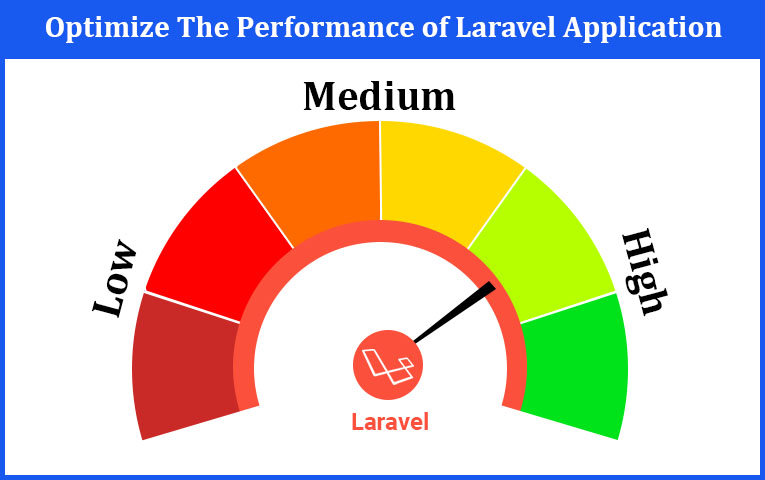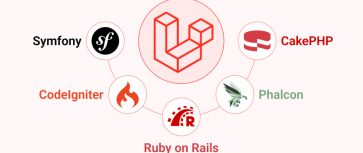Ultimate Steps to Improve Laravel Application Performance
The entire PHP community seems in awe right now especially looking at the way the Laravel framework overtook other frameworks in such a short span. Today, among all other open-source frameworks Laravel seems to have maintained its top position and has performed phenomenally since its inception. There is no debate about it that the web development space, Laravel has captured the attention of many developers. With its popularity, we have to look at some different aspects like how we can improve Laravel performance.
Now I have come across many of you who most of the time aren’t able to understand why they need to choose the right framework among the best ones such as Laravel, Spring, CodeIgniter, Symfony, Django, CakePHP, etc. The following post not just emphasizes what Laravel development is but also how improving Laravel performance enhances the process of web development by eliminating those complex codes.

1. Introducing Laravel Development
I am sure you must have checked out Builtwithlaravel.com by now to see which companies or industries have used Laravel for their project. Well, ApproveMe, Brightpearl, Fathom Analytics, Unified Infotech, and NMG are some of the big names, I have known so far but there are many others. Now before we move on to praising Laravel let me go through some basics.
What is an ideal programming framework? Like I said why people are asked to choose the right option instead of the best one? Because choosing the best one doesn’t mean it’s right for you. I mean an ideal option is said that reduces the efforts of the developers and can help developers to create visually stunning, flawless, and comprehensive web applications with desired features and functionalities.
Laravel is an open-source, PHP framework that can be used for web application development and MVC. Whether it is a small web application project or a complex and lengthy one, Laravel serves the core purpose due to some astonishing features such as simple and easy routing, easy verification and catching, appropriate session handling, and simple and flexible unit texting. For developers, the whole project completion will be seamless without any hindrances and confusion.
Further below I would like to mention some prominent benefits of Laravel development:
1. Top-Notch Security
Today developers have to develop the most secure web applications. A website procures data from various sources, including some crucial personal details from the customers too. To secure data, your website must have a mechanism that protects the data from external security breaches.
In fact, a Laravel application is said to be one of the most secure web frameworks featuring SQL injection that secures the codebase and other data. Laravel is considered one of the best security systems compared to other frameworks. It mitigates all the security risks and offers a smooth and flawless web application experience. If someone asks you why to choose Laravel, just tell him that Laravel is the best-secured network.
2. In-Built Functionalities
One of the finest aspects of Laravel is that it comprises a wide range of features, for which one doesn’t need to start any kind of coding from scratch. Have you ever given thought to why? Laravel is a ‘modular packaging system’ which comes with some good dependency management. This is also known as MVC Architecture or better known as Model-View-Controller Architecture. ‘ This means that a developer can easily create a package made out of his/her routinely used codes or install an already created package via Composer.
3. Superior Performance
Since everyone cares about performance so much, it may quite interest you to know that Laravel turns out to be the best when it comes to creating the best website performance including flawless features and superior speed. For any and every business, it is extremely important to have a website that performs smoothly and quickly. And speaking of today’s cut-throat competition, if your website has some performance issues, your target users will simply switch to your rivals. Laravel will not allow it as it offers the best performance for a website.
However, there are some features and functionalities in a Laravel application that might affect the performance of the web application, but Laravel has some excellent tools such as Memcached and Redis that help developers to boost the performance to the next level. All you need to do is to integrate the aforementioned tools within the Laravel framework and you will see a flawless performance of the web application.
4. Community Support
Much like other PHP frameworks such as Yii, Laravel has great community support. Laravel has a community that strives to make the application more flawless, interesting, and scalable. If a developer wants to develop a new complex feature or functionality, he/ she can always ask for a helping hand from community support.
Now when you are developing a project or any Laravel application, it does require some support to create robust and end-to-end web application features and functionalities. A large and supportive online community is bliss for developers and Laravel has a large community of online supporters.
5. Easily Adopt
Most novice programmers having intense experience love using Laravel because the documentation of Laravel is exceptional. It is nothing like other open-source plans, Laravel has outstanding documentation, that makes the task easy for developers and speeds up in a short time.
Also, tutorials and Laravel development tools are accessible in various formats and to make things simpler, Laravel applies expressive syntax. With these efforts, the Laravel application development company eases the process of learning the language and reading existing code for the developers. That means your developers use less time training and more time coding.
2. Laravel Performance Optimization – The What’s and Why’s
Now developing a website is not all! One does need to enhance Laravel performance to a great extent. Surely you have created a wonderful Laravel application but there is always room for perfection and enhancements.
The Laravel management information system enables you to take vital business decisions, and hence optimizing the performance of the Laravel app will surely enable improved business prospects. From simple web applications to complex APIs Laravel is a one-stop PHP development framework. A quick development approach, MVC architectural pattern, command PHP artisan, and a set of libraries make it so convenient to build well-structured beautiful code.
For example, Laravel comes with a very useful and unique tool named Artisan command and this is very helpful to boost performance
- PHP artisan config:cache
- PHP artisan route:cache
- PHP artisan optimize – Force
Laravel becomes faster to load the cache instead of loading the real object. But don’t forget to re-run this command after you’ve changed the config or your routes file. If not, Laravel will not handle your changes because it already loaded from the cache.
Now performance and optimization are two different factors that determine the success of every Laravel website or application. The framework is often used to build business information systems, and the performance of Laravel-powered applications has serious implications for the success of the business.
3. Some Performance Optimization Tips to Consider
Now it’s time to explore certain tips and tricks which can help you improve Laravel performance. Also, I believe these mentioned tips would prove to be of great help to Laravel developers who have entered the arena or the ones who have already been there for a long.
1. Route Caching
Techies who know Laravel inside-out would be well aware of the fact that Laravel enables you to cache the routes easily. All required to do is execute the Artisan Command for effective route caching:
- PHP artisan route: cache
After doing this, all your routes would be automatically cached in the routes.php.file.
So whenever you require routes next time, the cache would be accessed instead of the routes file. As a result, the Laravel application performance automatically gets increased and that too at a fanatic pace.
There is one more way! Once you have cached the routes, every time you need to add a new route, you will need to build the cache again. If you do not re-cache, the new routes will not be added. You can do it easily by clearing the cache using the “artisan route:clear” command and executing the command:
- PHP artisan route:cache
This will create a cache again! This was all about Route caching.
2. Config Caching
You must be knowing that a command-line tool named Artisan has been one of the best features offered by Laravel. But what you might not be knowing is that using it effectively can boost the performance of the application to a great extent. Remember the config app.php file?
You can cache the routes as well as config caching. You can execute the below command to cache config and routes :
- php artisan config:cache
- php artisan route:cache
Once you cache the config, all the changes made do not have any effect. If you wish to refresh the config, just run the above command once again. In order to clear the config cache, use the following command:
- php artisan config:clear
To further optimize the application, you could use OPcache which caches the PHP code so you don’t need to recompile it.
3. Optimizing the Composer Autoload
This is one of the best ways to enhance Laravel’s performance. Use composer to scan the application and create a one-to-one association of the classes and files in the application. Use the following command:
composer dumpautoload -o
4. Minimize Use Of Plugins
Of course, plugins are many so choosing the right one becomes more important for effective Laravel performance optimization. Also, these plugins will ultimately enable you to add more functionality. In addition, you get to explore more libraries and files to load, which can slow you down. So just make sure you take a look at what Laravel developers are loading through your config/app.php file and cut down unnecessary ones. Moreover, Laravel uses the composer to manage its components, so cutting down your composer.json file will reduce the dependencies that are loading.
5. JIT Compiler
One of the best tips for Laravel performance optimization is to translate PHP code to bytecode and then executing it is a resource-intensive process. And that’s the reason why go-between such as Zend Engine is required to execute the C subroutines. The entire process has to be repeated every time the app is executed. To reduce time, it is essential that this process is repeated just once. This is where the Just-in-Time (JIT) compilers prove to be very useful. For Laravel apps, the recommended JIT compiler is HHVM by Facebook.
6. Limit Included Libraries
Further included in performance optimization tips are libraries. An expert who is using the PHP framework to build web apps can add as many libraries as you want to add. But remember every time you add a new library, you are adding performance overhead to your application. It can impact the overall user experience also. In simple words, Laravel performance gets optimized to a great extent.
Of course, there is an option for reviewing all the libraries which are currently being used in your code. You can see these libraries in the config/app.php file.
If while scanning this file, you find any library which you are not currently using, you can comment that line in the config/app.php file. You should also scan composer.json to analyze the dependencies.
7. Use Deployment Tool to Appeal All Commands
Though this one is mentioned among the best performance optimization tips I am afraid it won’t boost the performance. Instead, it might boost a Laravel developer’s productivity. It is very important to automate the deployment site. A library named deployer could be used to build deployment automation.
php deployer.phar deploy production
Post which you need to configure your git repository and execute the command “dep deploy”. It will deploy your code directly on the remote server.
It automates all the tasks of copying to the remote server, starting the server, and managing the remote host.
8. Eager Loading
Now, what happens when you execute any query in Laravel, it will lazily execute the query. It will fetch the data only when it is required. Is it good or bad? Well, in some cases eager loading increases the amount of queries executed and at the same time decreases the performance of the application.
For example, If you want to fetch the name of the author of the books located in a library. Eager loading can offer:
$books = App\Book::all(); foreach ($books as $book) { echo $book->author->name; } |
Technically, each time when the loop is executed, the query automatically gets executed. As a solution, we have Laravel’s eager loading feature that enhances your query execution time and decreases the number of queries. Like this:
$books = App\Book::with('author')->get(); foreach ($books as $book) { echo $book->author->name; } |
4. Conclusion
And we are done! We hope you like this articulation! And I hope it turns out to be extremely fruitful in your upcoming Laravel app development projects.

Hardik Dhanani has a strong technical proficiency and domain expertise which comes by managing multiple development projects of clients from different demographics. Hardik helps clients gain added-advantage over compliance and technological trends. He is one of the core members of the technical analysis team.
...
 Jul 14, 2021
Jul 14, 2021 



Comments
Leave a message...